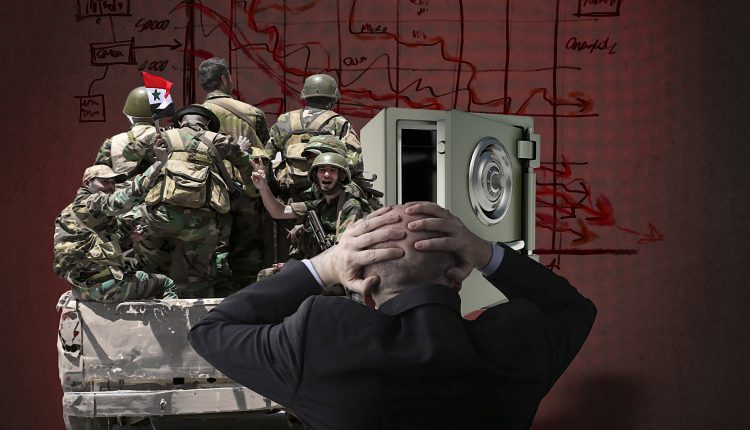Financial crisis in Damascus as Syrian government demands that conscripts pay in dollars yet prevents foreign currency trading
The economic situation in Syrian government-controlled areas has begun to cast its shadow over the general chaos there, beginning with the fall of industrial production, rising inflation, the rapid collapse of the Syrian pound, poor living conditions, and low purchasing power, causing Damascus to acknowledge this crisis after periods of denial and begin looking for foreign alternatives in order to prevent the economy from collapsing.
Last week, Syrian President Bashar Al-Assad issued a legislative decree stating that draftees who have been called for reserve military service, have reached 40 years of age, and have not yet joined the service should pay 4,800 USD, or the equivalent in Syrian pounds, to be exempt.
According to the official SANA news agency, the decree states that those who have joined the reserve military service, reached the age of 40, and are still performing their service should also pay the aforementioned fee. However, a deduction of 200 USD or the equivalent in Syrian pounds is allowed for each month performed in reserve service.
A wave of anger, denunciation, and ridicule erupted among Syrians and on social media after the decree was issued. Meanwhile, the government rejected the exchange and trade of foreign currencies within the country yet continue to do so themselves. Fines are also imposed on traders amounting to millions of Syrian pounds. In addition, Damascus is still ignoring Syrians hardships and the main factors causing the crises through which the country is living – avoiding any suggestions and solutions to end the tragic conditions and continue striving to achieve financial returns. In parallel, officers and personnel of the government forces continue to impose taxes and royalties on civilians.
Extorting the people and making profits
“This decree is to increase the extortion and exploitation of the Syrian people in all possible ways, despite the dire situation that Syrians are experiencing. All the money that the Syrian regime collects does not directly go to the state treasury, but rather to the ruling gang and to their supporters. In addition, Bashar Al-Assad wants to highlight his status as the president and issue decrees that benefit the people, knowing that all who are with and against him know that he does nothing but humiliate the people and sacrifice everything in order to stay in power” says Samer Al-Khelaiwi, writer and political analyst.
Al-Khelaiwi said in a statement to Target: “The matter will extend beyond this point – Bashar al-Assad will continue to issue decrees in all fields in order to steal from the Syrian people who are suffering from many problems, not just economic ones. No problems will be solved as long as Bashar remains in power. These problems, however, will increase as we have seen in the past years. The only resolution will be the departure of this ruling clique”.
Analysts and observers argue that this and previous decrees, related to the payment of cash alternatives for forced conscription, reveal that the financial crisis and the reserve of foreign currency have reached record low levels in government areas. There is real fear of a sudden deterioration of the Syrian pound, causing the country’s economy to collapse in a way that is difficult to control. This could result in the closure of institutions and mass protest. The state therefore seeks to secure an economic dividend for the treasury from people targeted by the decree, such as elderly people who are willing to pay in order not to do military service – in particular those who live outside the country and need official papers.
Loss of trust in the military institutions
According to analysts, these decrees show the reluctance of Syrians to join mandatory conscription because of the loss of trust in the military institution, especially after the outbreak of the civil war in 2011. As well as the accusations against it of responsibility for the killing of hundreds of thousands of Syrians and the destruction of large parts of the country, this institution has lost track of its main aim, which is to protect the security and borders of the country rather than protect the authorities. It is not taking any action or steps against the other states occupying parts of Syria, as well as the factions who control large areas, in parallel with the years-long bombardment by Israel.
Most media reports show that the Syrian government is experiencing its most critical times politically, economically, and financially, despite the fact that some Arab and regional countries are willing to normalize their relations with them. This process saw difficulties in recent times in its own inability to fulfill the conditions required of it. This has been made obvious by the fact that a large number of Emirati companies are turning away from investing in Syria, real estate in particular, and Abu Dhabi’s reluctance to continue financial support for Damascus, revealed by the Lebanese newspaper Al-Akhbar months ago.
The Damascus government is working to secure alternative funding, especially after the absence of any results from an economic standpoint of Assad’s visit to China, upon which he relied greatly, according to mass media affiliated with, and close to, Damascus in the period following the visit.

